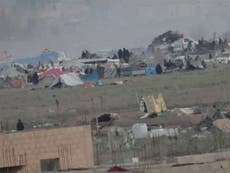Shamima Begum offers Britain a chance to show both the steel and compassion in our justice system
If and when she does turn up she may then be questioned and, if justified, charged. It is how this country deals with people, no matter what their reputation
Shamima Begum is hardly an ideal poster girl for liberal values. According to a newspaper interview, and with no attempt to sensationalise, she appears to be still sympathetic to the so-called Islamic State “caliphate”, expresses little if any remorse about her activities, and, as far the media is concerned, expresses the opinion that journalists can be “enemies of the caliphate”.
In the four years since she and two other school friends took the opportunity of a half-term break to make the journey from Bethnal Green to join a medieval death cult in the Middle East, much has happened to them. One apparently died in a bombing, and the whereabouts of the other is unknown. Ms Begum got married, lost two children to malnutrition and disease. Her first sight of a severed head in a bin, she says, “didn’t faze me at all”.
Now she has been discovered in a refugee camp in Syria, heavily pregnant, her partner, a Dutch national, not in attendance. She is weary and wishes to come home, but seemingly only because the war is over.
The caliphate, she thinks, suffered from too much oppression and corruption. “I don’t think they deserved victory,” she said. But she didn’t seem to mind so much that Isis sawed the heads off journalists or aid volunteers with kitchen knives.
In her own words: “I’m not the same silly little 15-year old schoolgirl who ran away from Bethnal Green four years ago. And I don’t regret coming here.”
Her main interest in returning herself to Britain seems to be the collapse of her home with Isis and subsequent concerns about the welfare of her about-to-be-born baby. If, in other words, Isis still controlled vast swathes of Iraq and Syria she’d have been content to stay put, perhaps.
Aside from her own account, we cannot know what, precisely, Ms Begum has been engaged in for the past few years. She may have committed crimes. That should be a matter for official investigation in advance of her returning to Britain, which may well happen sooner or later, even if the British authorities make no attempt to “rescue” or arrest her (as they need not).
If and when she does turn up she may then be questioned and, if justified, charged and sent for trial. It is how this country deals with people, no matter what their reputation, or even what they themselves have said; they have a right to justice and a fair trial.
During that process, if it comes to pass, we will discover much more objective truth about whether, for example, Ms Begum is more victim than perpetrator; the extent to which she was “groomed” or “brainwashed” either before or after her arrival in Syria. There has been a good deal of speculation about that, but little properly examined evidence.
Thus, despite everything, Shamima Begum remains a British citizen, and not enough is known to justify her being summarily deprived of her citizenship. A better path could be to impose a temporary exclusion order, under which she would not be able to return to Britain until she has agreed to an investigation, monitoring and, if required, deradicalisation.
That might still leave the question of the fate of her child, and its nationality, having been born in Syria of British and Dutch parents. Indeed the upbringing of that baby may prove the most morally challenging task of all.
Whatever her past, or her immediate fate, Shamima Begum is destined to be the subject of intense media scrutiny, to put it mildly, for the rest of her life. Indeed, such is the atmosphere, she could not be guaranteed safety from vigilantes – or far-right terrorists – in most circumstances without a new identity or police protection, possibly combined with surveillance, depending on how her life evolves.
If her story reminds us of anything, it is how difficult it is to legislate for those returning from the wars in Syria, Iraq and elsewhere, with often confused identities and, sometimes, evil intent.
Each case is different, every circumstance unique. The only solution is to consider each one dispassionately. That is what the criminal justice system is for, and declaring someone guilty of unspecified crimes or rendering them stateless without due process is not only a violation of the human rights we in the west are supposed to uphold, but risks pushing that individual into a world of terror and murder.
Soon enough we will know the whole truth about Ms Begum, and we are a mature and civilised enough country to be able to work out how to deal with her fairly. After four years under Isis, she may even find herself somewhat fazed by the notions of compassion and justice.





Join our commenting forum
Join thought-provoking conversations, follow other Independent readers and see their replies